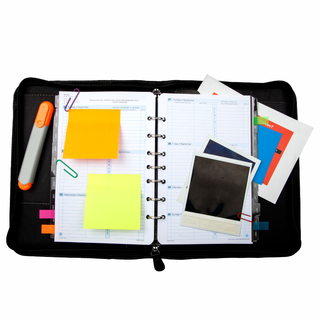 I suppose a blog could go a lot of ways with a title like this. I’m actually talking about literally keeping it all together - as in your child’s medical files. If you have a kiddo dealing with more than common childhood bumps, bruises, breaks and illnesses, keeping track of all the information from labs, meds and doctors can be a real feat. If you don’t have all of the right information at the right time, it can cause some hold ups in the process of helping your child get the care that he or she may need. So let’s talk ideas on how to do our best to keep it together. Digitize Me Not all - and we get that - but most of us have some form of device that can take a photo and store it. We typically carry that thing around with us all, if not most, of the time. If you have a smartphone or a tablet, you can capture images of your child’s paperwork and keep them in folders that are easily accessible. You can carry these to any and every appointment and have it right there with you at check ins or when visiting with the provider. This can also be a plus when trying to make appointments. GoogleKeep is one of those apps, among others, that help organize photos and give a place for notes, lists and sharing. This capability can be great if one parent takes a kiddo to one appointment because it fits her schedule and the next appointment fits his - with the shared documents, it will all be right there for whoever needs it. Bind It For those of us who still love our paper - hand raised high here! - there are some great tips and tools out there for compiling medical information into notebooks and journals. If this works better for you and you can remember to carry it with you, be sure to always keep it updated. If you need tabs to help you keep things organized, like “medications” or “lab work” or a doctor, this can help you quickly find what you need when you need it. You can leave space in here with places you can take notes when you’re on the phone or in an appointment. This route can be handy if a copy needs to be made. But How Do I Get It? Sometimes it can be a challenge to get records for various reasons. It can be a challenge sometimes for records to get passed around to the different offices that may need them, so if you can get your hands on a copy (paper or digital) that can help with some of the communication challenges. You have a right to your child’s records. You can call the provider’s office or stop in or get a copy mailed to you. In a perfect world all of the technology and exchanges of information would run smoothly and on time. And we all know that we don’t live in that world. It is ok to make sure you have what you need from your child’s medical records in order to coordinate care with other providers. Errors may happen for a myriad of reasons, so gently stick to your guns and make sure that you have everything because you, as the parent/guardian of your child, will always be the hub of information in each appointment (or phone call). However you find a system that works for you, be sure to keep it all together. It will save you some headaches and keep communication open and more clear with your child’s providers as you all do your best to meet the needs of your child on his/her medical journey. For more tips or tricks or support in gathering and storing your child’s medical records, please reach out to me at [email protected] or 307-333-1273 and I’d be happy to help!
Categories All
0 Comments
 Schools OUT! Congratulations to our Wyoming students, schools, and parents! You have made it or are weeks away from completing another year! There are challenges that come with every year and we want to cheer loud for you all who overcame and persevered! Now What? A well deserved break has now come for most with the approach of summer. And parents may also be scrambling to figure out what to do next, especially if they work through the whole year! While it may come with its own challenges, summer can be a great time for new and different experiences for your family, even if you have a child diagnosed with a chronic illness or medically complex condition. Summer Camp There are so many options out there for “childcare” during the summer that don't necessarily have to look like or feel like your child has a babysitter from June through August. Be sure to check out your local clubs, gyms, churches and other organizations to find out about their summer programs! Even if it is a shortened experience like a week-long camp, accommodations may be able to be made if your child needs certain support (help with checking blood sugar, medications, mobility, etc.). If you’d like to find a camp that is specific to your child’s experience in life with a medical condition, I can help point you in that direction as they do exist (pending location and diagnosis) and are wonderful programs! Some summer fun with old or new friends with plenty of learning opportunities on the life spectrum can continue to help shape your child into a neat young man or woman. J.O.B. Summer is an opportunity for your kiddo to get other experiences that will help them in the future from work. There are lots of opportunities to explore, even if your child has a specific interest. There is plenty of yard work to be done! If a full time, independent job within the workforce is not where your kiddo is for various reasons (age, ability, illness), your neighbors may well appreciate a responsible young person who will water gardens, mow yards, and/or take care of pets while they are away. You can also think about ways they can do the same work at your own home - plant your own garden and watch the pay out with your child learning to enjoy some responsibility. The possibilities are endless! Start a conversation with your child and see what interests he or she has and watch them learn and grow. Being given the chance to contribute and discover sparks of passion can be so meaningful as they learn more about themselves! Family Excursions We all know things are difficult right now on our pocket books. So how can we face that challenge of building family memories of togetherness and adventure without breaking the bank? Living in Wyoming, our rural status has its pros and cons. One pro is access to the great outdoors and some cool things to do in our own small towns. Whether it’s a picnic in a park, camping in the backyard, walking through a museum, or getting to the next town over to experience something different - we have options here that we can make special for our own family’s needs and abilities. Parents, don’t feel pressured or shamed for not being able to pack up the kids and head to Disney. Your kids will experience the love you have for them wherever you are together in your efforts to spend time with them. Balancing a New Routine Summer can feel euphoric with the promise of warm, sunny and carefree days. And if you care for a child with some form of special need, the change in routines and support systems found within the school can be a bumpy one. Remember that you can build another support system for these months and it can come in various forms. Keep doing all of the essentials for your kiddos - meds, doctor appointments, therapies, etc. - and see what opportunities there may be for you, too, to kick back and from some R&R this summer. If the school year is wrapping up too quickly for you and you’re starting to feel the panic rise over what to do with your kiddo(s) this summer, our Patient Advocacy Team is here to support you. Feel free to call, email or find us on the web to see how we can help you work through this summer transition! O:307.333.1273 [email protected] www.oliviacaldwellfoundation.org You can find us on your favorite social media platform!
Categories All  If you have a child with a chronic illness or medically complex condition, you may find that your child’s care goes well beyond the usual visits to the doctors office. And if you live in rural Wyoming and have specialty care needs, that means you get to travel for that care. So when it’s all said and done, your kiddo with those extra medical needs and care will have a larger team on his or her side. That can be a little overwhelming, so I’d like to take this chance to share some good news about one person who will likely be a part of your child’s care team. In honor of National Social Workers month this March, social workers are our spotlight team members! The Social Worker The clinical social worker employed by a hospital can be such an important piece of your care. Sometimes we may have this idea that a social worker is scary and only shows up when our kids are taken away for some sort of neglect or abuse, but actually they are there to really care for you and your child! Let me share some of the great ways these folks can help you take the next steps in your child’s medical journey. 1) Counseling As a licensed clinical social worker (LCSW), these are professional counselors, trained in various ways to help you and your child process through a particular struggle in life. That could be the news of a diagnosis, grief from loss, trauma from an accident and more. They can help you, individually and as a family begin the process of understanding what you have experienced and share how you can overcome it. They can help answer questions about a treatment process or what can be expected with a certain diagnosis in a language that you and your child can understand, especially those who work in pediatric-specific areas. This is such an awesome and important opportunity for your family to strengthen your hearts and minds as you move forward with whatever the future holds. 2) Insurance Gurus Whether it was an accident, a premature birth, or a chronic illness that has been in the cards for a while now, as adults we always want our children to have the best care - and be able to afford it. That “and” can be a pretty big hurdle to overcome. Social workers are well versed with insurance company’s policies and they can help you work through how that “and” can be a possibility. They can also help find other support that you need from organizations that have funds to cover specific things. It’s not easy to ask for help, especially financially. And if we want to help care for our children today, we need to take steps to make sure that we can also take care of them tomorrow. Social workers are great at helping you see the path to do that. 3) Going Home Social workers are a big part of the process to get your family home in a way that will help you succeed. If there are barriers in care or equipment, they can help make sure you have what you need to keep your child on the right track. That can be anything from oxygen to walkers! They can also help to make sure your child’s follow up care is mapped out. They can also help you get connected to other resources at home. Partners We are grateful for the whole team that cares for our Wyoming children! In the Patient Advocacy Program, I get to work alongside social workers and those within their team to be able to help connect families to some of those local resources and support services that they need. I like being able to encourage our families to reach out to their social worker when their child has an appointment with their specialist when I know of needs they can support. Yes, part of the social workers job is to ensure that our children are safe. And a big part of how they ensure that is happening is by caring for us - parents - while we take care of them! Be sure to take advantage of this important person on your care team, as you walk with your child through their medical journey! If you have any questions, please don’t hesitate to ask - you can reach me at (307) 333-1273 or [email protected]
Categories All |
AuthorWrite something about yourself. No need to be fancy, just an overview. Archives
December 2022
Categories
All
|




 RSS Feed
RSS Feed



